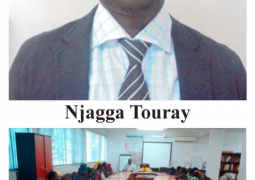National
Agricultural Land and Water Management Development (Nema) project, on
Wednesday, recognised the efforts of farmers as a way of sharing lessons,
successes and best practices from agriculture sector projects.
The
visibility event was highlighted for project achievements and illustrates how
the project has contributed to improving the lives and livelihoods of rural
populations across the country.
Government
of the Gambia through its Ministry of Agriculture, with support from IFAD,
AfDB, IDB and other key partners, initiated the National Agricultural Land and
Water Management Development project Climate Resilience of the National Land
and Water Management Development project (CHOSSO), to tackle the most
concerning challenges.
Nema
Project director, Momodou Gassama said the development goal of the project is
to reduce poverty of rural women and youth by increasing incomes from improved
productivity base on sustainable land and water management practices.
He
said the project reflects the resolve of the International Fund for
Agricultural Development (IFAD) and Government of The Gambia to continue
investing in improving the lives of poor rural people in the country.
Permanent
secretary at the ministry of agriculture, Momodou Mbye Jabang said the
innovations and good practiced showcased in the visibility day will continue to
provide useful lessons and guidance for sustainable rural and agricultural
development in the Gambia.
“Through
Nema, the Government’s Ministry of Agriculture has adopted a systemic,
cost-efficient approach to addressing some of the challenges faced by community
vegetable farmers while, at the same, offering them the potential to grow and
harvest crops during both the rainy and dry seasons.”
Country
director of International Fund for Agricultural Development (IFAD), Haoua
Sienta, said IFAD has developed more than ten projects in the Gambia and
reaching more than thousand households in the rural areas.
She
said for the upcoming project, they develop country strategic with the
government of the Gambia which is mainly targeting youth and climate change
because they want farmers to be more resilient to climate change.
The
project is worth about $80M and it will be the biggest project in agricultural
development in the Gambia and it would run for 6 years, she said.



